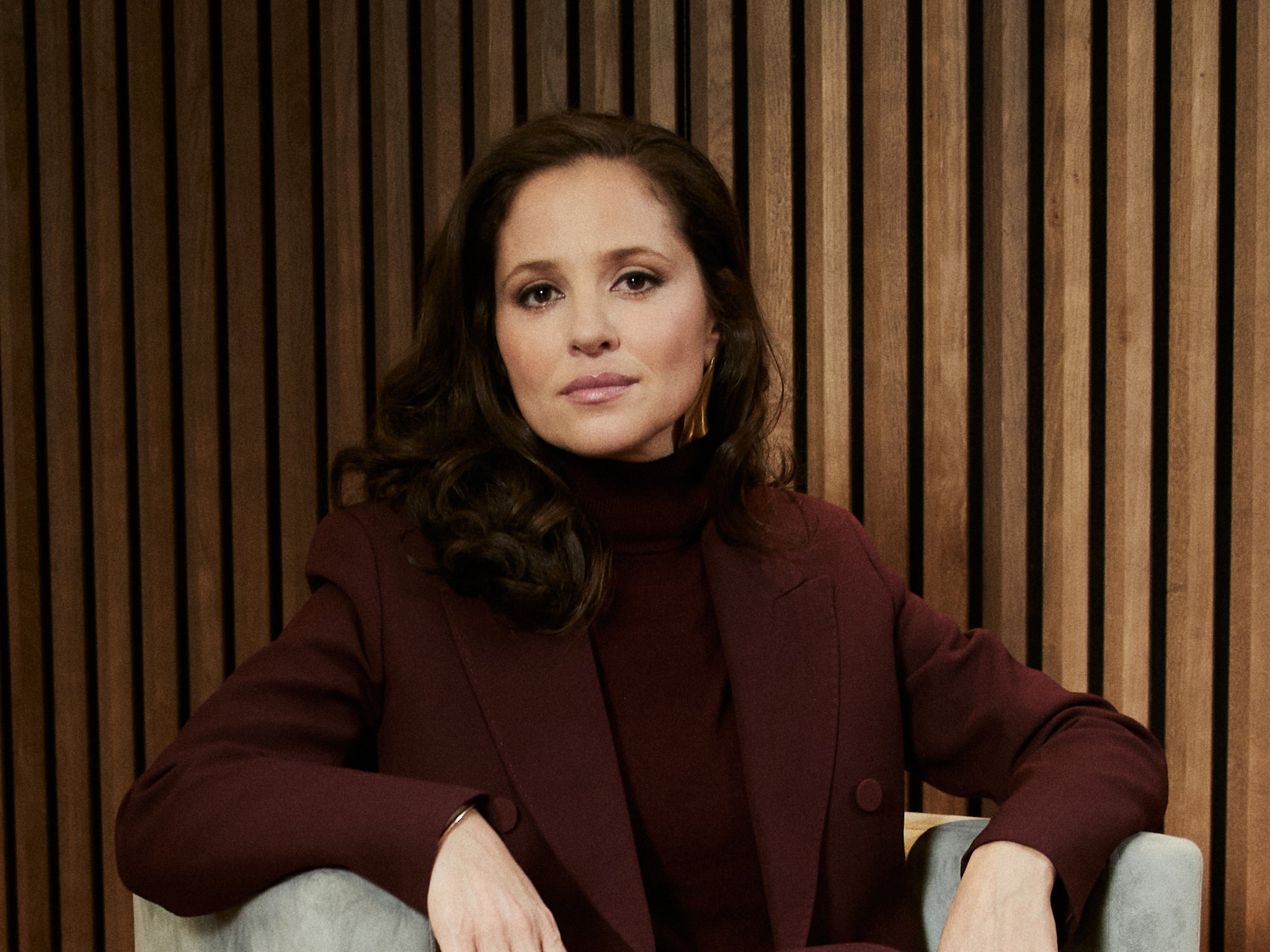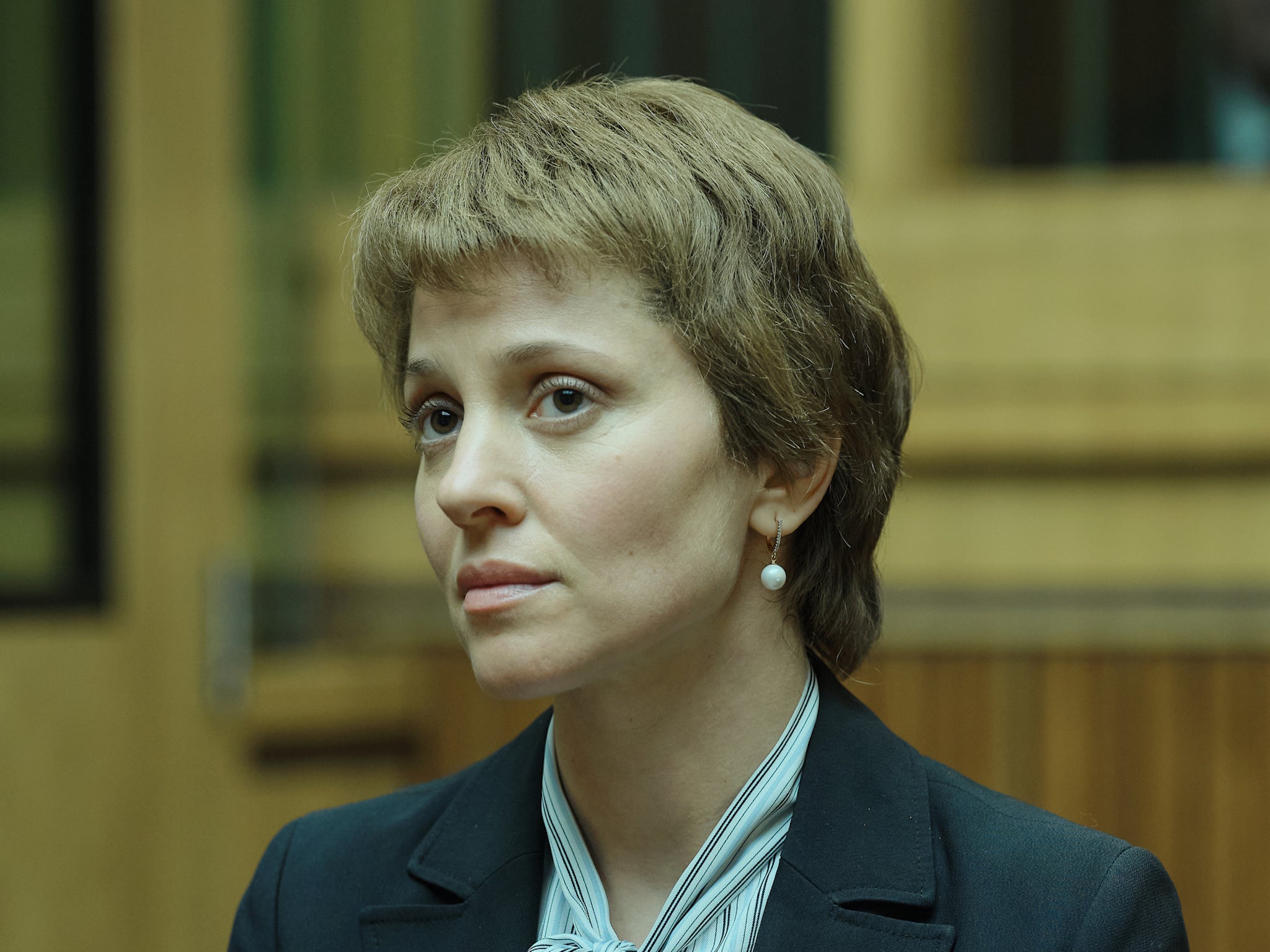‘I was scared, not necessarily for my life – although it did cross my mind’: Margarita Levieva on starring in Litvinenko
The Russian-American actor talks to Annabel Nugent about playing the wife of the murdered defector, war propaganda and being a gymnast ‘owned by the government’


Your support helps us to tell the story
From reproductive rights to climate change to Big Tech, The Independent is on the ground when the story is developing. Whether it's investigating the financials of Elon Musk's pro-Trump PAC or producing our latest documentary, 'The A Word', which shines a light on the American women fighting for reproductive rights, we know how important it is to parse out the facts from the messaging.
At such a critical moment in US history, we need reporters on the ground. Your donation allows us to keep sending journalists to speak to both sides of the story.
The Independent is trusted by Americans across the entire political spectrum. And unlike many other quality news outlets, we choose not to lock Americans out of our reporting and analysis with paywalls. We believe quality journalism should be available to everyone, paid for by those who can afford it.
Your support makes all the difference.On a balmy Tuesday morning in September last year, the European Court of Human Rights ruled that the Russian government was responsible for the 2006 murder of Alexander Litvinenko, the FSB officer turned whistleblower whose green tea was poisoned with the radioactive element polonium at a London hotel. On the same day, Margarita Levieva, in costume as his wife Marina, was laying Litvinenko, played by David Tennant, to rest at Highgate Cemetery. It was the final scene for the ITV mini-series Litvinenko. “How auspicious,” says Levieva of the timing. In between takes, she texted the real-life Marina congratulations. The EU court’s ruling was the result of a 15-year-long campaign led by Marina to have her husband’s killers publicly acknowledged.
The 42-year-old Levieva is calling from Wales, where she is filming the much-anticipated Star Wars: Acolyte series. (On that and her recent casting in Marvel’s Daredevil – incidentally, perhaps one of the only shows more anticipated than Acolyte – Levieva can only laugh and point to her non-disclosure agreements, “I’m not getting in any trouble!”) Litvinenko is a very different, more serious beast. The four-part series follows Litvinenko as he investigates his poisoning from a hospital bed, and his wife Marina as she leads a subsequent quest for justice, fighting to have Vladimir Putin’s part in her husband’s murder officially acknowledged – a part that the Russian government still denies. The Kremlin called last year’s ruling, which went further even than the UK public inquiry of 2015, “groundless”.
Levieva is nervous. Not only because she is an actor days away from a big release, but because of this specific release and what it could mean; for audiences, for Marina, and for herself. Leveiva thought twice about accepting the part. “Putin is not someone who is OK with people going against him. He takes really serious action in return so I was scared, not necessarily for my life – although that did cross my mind – but I was scared of what it would mean.” Levieva grew up in Russia and still has family there. She hoped one day to have a career there. “Doing this and certainly recent events [ the war in Ukraine] has put an end to that, for sure. I don’t know if and when I will ever be going back to Russia. At this point, I don’t know if that’s a reality.”
Ultimately, she decided it was too important a role not to play. Marina herself had given the series her support. Without her approval, Levieva says she probably wouldn’t have gone ahead with it. “That would be hard to do without her blessing. To go against someone’s wishes and tell their story, especially when they’re alive, wouldn’t sit right with me.” Levieva praises Marina as an “unbelievable force” and the two are friends now. They have tickets to see Tennant’s new play GOOD together. And as for Russia’s response to the show, Levieva’s friends and family reassured her that even Putin’s reach isn’t infinite and that he is not “as vicious about” his critics in the West. She hesitates slightly. It’s the only point in our conversation where Levieva looks at all apprehensive of what she is going to say but she shrugs it off – “I doubt Putin will be reading an interview about me” – and forges on. “He can’t pursue [all of his critics] but I’m sure if I was a Russian actress living in Russia who decided to make this project, that would have very different consequences for me.”
The cause and culprit of Letvineko’s murder is common knowledge – and since last year, official knowledge, too. But in Russia, it remains up for debate. Levieva recalls telling a friend back home how excited she was to play Marina. To her shock, this friend spewed a line of Putin’s spin back at her. “He said, ‘Oh that guy was a madman. Who knows what’s even true at this point?’” The propaganda runs deep, she says solemnly.
Lately, Levieva has come face to face with that reality in regard to the country’s war on Ukraine. “I have good friends and family members who still don’t believe what’s happening because the story they’re being told is so different.” Her mother, she says, cut ties with childhood friends because she couldn’t bear to listen to their lies anymore. “I try to remind my mom of the intensity of propaganda that these people are living with. It’s so deeply ingrained in a cellular way from birth.” On some level, Levieva can understand. “I grew up in Russia. I was once a Pioneer [the communist youth organisation similar to Scouts and Girl Guides], I was a believer, and I too carried for a little while the idea that everything the government says is true and that we must respect and serve them.” How wild is that, she asks, eyes wide in disbelief at her own naivete.
Levieva was born in St Petersburg, back when it was Leningrad and Russia was still the USSR. When she was 13, her mother moved her and her twin brother to the US where they settled in Sheepshead, Brooklyn. “She feared for what our future would look like if she raised us in Russia. She left everything. No papers. No money. No English. She went from being a professor of mathematics to packing grocery bags. She did what she had to do.” Levieva’s father chose to stay behind. “I think for him it was the fear of not speaking the language and having to find work. He thought he would be more useful to us staying in Russia.” It’s funny, says Levieva. It is always the women in her family who find the courage to leave. Her grandmother, too, left her husband of 30 years to join them in the US. She worked as a nanny.
As a child, Levieva competed as a rhythmic gymnast – skills she puts to use in stunt work on shows such as last year’s Netflix spy thriller In from the Cold. “It sounds extreme, but I was owned by the government. It was communism so they paid for my training and the training was provided by the government.” It was gruelling. She trained twice a day, seven days a week. She kept it up when they moved to the US, but it was different. For one thing, the training was much less severe. She recalls seeing a group of girls her age eating sandwiches on their break. “The fact that they had a break or the fact that they were eating sandwiches, that would never have been OK in Russia.” She has mixed feelings about it now. Her training was harsh, but it gave her purpose.

Similarly, assimilating in the US was tough but exciting. “I told myself that if I was going to live in America, I wanted to be an American.” Even from that early age, Levieva knew she didn’t want to be an immigrant who stayed within the city’s Russian bubble, eating only Russian food and speaking only Russian. “It’s always hard, though, to be the other. Even in Russia, we weren’t termed Russian. We were Jewish; our passport said Jewish and that was our nationality. We hid our passports because we didn’t want our friends to know. In Russia, I was the Jewish girl and then in America, I was the Russian girl.”

Watch Apple TV+ free for 7 days
New subscribers only. £8.99/mo. after free trial. Plan auto-renews until cancelled

Watch Apple TV+ free for 7 days
New subscribers only. £8.99/mo. after free trial. Plan auto-renews until cancelled
Levieva was accepted into New York’s renowned LaGuardia school for creative arts to study dance, where notable alumni include Jennifer Aniston, Robert DeNiro, and Al Pacino. She turned it down to pursue a more stable profession; thoughts of her mum and all that she had sacrified crept in. Leveiva graduated from NYU a year early with a double major in Economics and Philosophy – “with honours!” she laughs. Eventually, she returned to the arts and, not wanting to die with any regrets, decided to give acting a go. She attended an acting conservatory and did well; she was one of 20 students invited to partake in a master class. Auditions followed, and with them, film and TV offers. She has acted consistently since, starring with Jesse Eisenberg and Kristen Stewart in Adventureland (2009), then Alexander Skarsgård and Kristen Wiig in The Diary of a Teenage Girl (2015). She had a major role in the hit drama Revenge and in James Franco’s HBO series The Deuce.
Levieva counts herself lucky that she hasn’t been pigeonholed in her career – not as a Russian at least. “Actually, people thought I was Spanish because of my name, so they wouldn’t want to see me because of that,” she laughs. “Also when I auditioned for Jewish roles, they would say, ‘Oh, you don’t look Jewish.’ And then I would never get cast for Russian parts because the American idea of Russian is a blonde, blue-eyed tall woman with high cheekbones and I’m just not that,” she says, gesturing at her curly brown hair and 5ft 5in frame. It’s only recently, Levieva says, that she has begun playing Russian parts such as Marina in Litvinenko.
“I certainly don’t believe that as an actor you have to come from the place of the person that you’re playing but there is something important to me about playing Russian parts,” she says. One of her teachers used to speak a lot about blood memory, the idea that the experiences of one generation are passed onto the next through DNA. “I did a play about the Holocaust in 2010 and it just resonated with something inside of me,” she says, grasping at her chest. “And when I speak Russian on screen, it speaks to that same part of me. It’s very deep.”
‘Litvinenko’ will be available to stream on ITVX on 15 December



Join our commenting forum
Join thought-provoking conversations, follow other Independent readers and see their replies
Comments